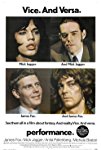Eye For Film >> Movies >> Performance (1970) Film Review
Performance
Reviewed by: Jennie Kermode

Though he never did reach the dizzying heights of fame which he understood so well, director Donald Cammell gave everything to his films. He was eventually to kill himself when his later work, Wild Side, was cut by the studio that backed it (it's said he asked for a mirror to watch himself die, performing to the last). This film was the product of earlier, though perhaps not happier, days. It almost didn't happen. It had been billed as a cheerful rock star romp, and when Warner Bros saw the final print they wanted to burn the negative. Few films backed by mainstream studios have ever caused such an outcry. But by combining high art with vicious violence, graphic sexuality and a vision all his own, Cammell created a work that has become the stuff of legend.
So what is Performance about? On the surface of it, it's the simple tale of a gangster, Chas (James Fox) whose love of violence gets him into trouble and who goes on the run, hiding out in a tenement building owned by dissolute former rock star Turner (Mick Jagger). There he finds himself torn between a desire to share in the Bohemian pleasures of the building's other inhabitants and a frantic concern with hanging onto his hard-man image, even if he's the only person who cares how he might appear. But those who approach the film in this way, too literally, are bound to be confounded as it develops, and all the more so by its ambiguous ending. It's not so much a linear story of one man's adventures as an enquiry into the nature of performance, gender and the very structure of society.

Chas' world is all about rules. Though he may have broken one, they are still very much part of his life, of his sense of self. He knows what it is to be a man and can delineate himself through his aggression. Turner, meanwhile, lives in a world where there are no rules. He is studied through traditionally feminine imagery, the original poster shot presenting him like a starlet of the day, and his boundaries are expressed through his uses of pleasure. But neither of these men is wholly satisfied. Turner knows why. In living as he does, he has lost the 'demon' which once drove his creative passions, and he sees a similar flaw in Chas. They have both become prisoners of the roles they perform within life. He becomes determined to liberate Chas, but in doing so he is also seeking a solution for himself. It's no accident that he keeps books by Jorge Luis Borges beside his fateful bed.
Performance broke new ground in its depiction of drug use (rumoured to have been real) and in its use of cut-up technique to further distill its deliberately fractured narrative. Nic Roeg's sumptuous cinematography gave it a heightened sensuality further enhanced by musical performances very far from Warner Bros' expectations. It also featured graphic sex scenes previously unseen in big studio films, including depictions of homosexual encounters at a time when acts between men had only just been made legal (and then only in private). It helped Jagger kiss goodbye once and for all to the lightweight pop star aspects of his image. After all these years, it remains his most impressive acting work, and there are strong performances all round.
Despite all this, Performance remains rarely seen. It was just too much for mainstream audiences, which still find it challenging today. One of those rare pieces of cinema made on a sizeable budget yet the product of undiluted vision, it's a work whose nature goes some way toward challenging the structure of cinema itself. If you haven't see it yet, it's well worth checking out, especially if you're open to reconsidering the boundaries of your own role.
Reviewed on: 24 Jun 2009


















